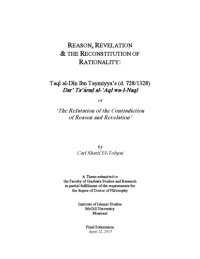
Ebook: Reason, revelation & the reconstitution of rationality: Taqī al-Dīn Ibn Taymiyya’s (d. 728/1328) «Dar’ Ta ’ārud al- ’Aql wa-l-Naql» or "The refutation of the contradiction of reason and revelation"
- Genre: Religion
- Tags: Islam Ibn Taymiyya Reason Rationality
- Year: 2013
- Publisher: McGill University
- Language: English
- pdf
Abstract
This thesis explores the broad outlines of Ibn Taymiyya's attempt to resolve the "conflict" between reason and revelation in late medieval Islam in his 10-volume, 4,000-page magnum opus, Dar’ ta‘arud al-‘aql wa-l-naql, or The Refutation of the Contradiction of Reason and Revelation, by breaking down and systematically reconstituting the basic categories in terms of which the debate was framed. The perceived conflict between revelation and reason centered on the interpretation of a number of Divine Attributes, considered rationally indefensible by the philosophers and the Mu‘tazila because their affirmation would involve an unacceptable assimilation (tashbih) of God to created beings. This stance culminated in the Ash‘arite theologian Fakhr al-Din al-Razi's "Universal Law" (qanun kulli), which stated that whenever a conflict between revelation and reason arises, the dictates of reason must be given priority and revelation interpreted metaphorically through ta’wil. Ibn Taymiyya counters these claims with a comprehensive response, attacking the logical integrity of the Universal Law but also articulating a textually self-sufficient hermeneutic and devising a radical reformulation of the philosophers' ontology, particularly their realist theory of universals which has resulted in a chronic confusion between what exists logically in the mind and what exists ontologically in external reality. This in turn allows him to elaborate a new epistemology based on three principal avenues for gaining knowledge, namely, "hiss," or sense perception; "khabar," or the transmission of reports (particularly revelation); and "‘aql," or rational knowledge (both innate and inferred). These sources of knowledge are corroborated by the mechanism of tawatur and under-girded by an expanded notion of the fitra. The disparate elements of Ibn Tay-miyya's theory of language, his ontology, and his epistemology eventually converge into a synthesis meant to accommodate a robust and rationally defensible affirmationism vis-à-vis the Divine Attributes while yet avoiding the tashbih generally presumed by the later tradition to be inevitably entailed thereby.
This thesis explores the broad outlines of Ibn Taymiyya's attempt to resolve the "conflict" between reason and revelation in late medieval Islam in his 10-volume, 4,000-page magnum opus, Dar’ ta‘arud al-‘aql wa-l-naql, or The Refutation of the Contradiction of Reason and Revelation, by breaking down and systematically reconstituting the basic categories in terms of which the debate was framed. The perceived conflict between revelation and reason centered on the interpretation of a number of Divine Attributes, considered rationally indefensible by the philosophers and the Mu‘tazila because their affirmation would involve an unacceptable assimilation (tashbih) of God to created beings. This stance culminated in the Ash‘arite theologian Fakhr al-Din al-Razi's "Universal Law" (qanun kulli), which stated that whenever a conflict between revelation and reason arises, the dictates of reason must be given priority and revelation interpreted metaphorically through ta’wil. Ibn Taymiyya counters these claims with a comprehensive response, attacking the logical integrity of the Universal Law but also articulating a textually self-sufficient hermeneutic and devising a radical reformulation of the philosophers' ontology, particularly their realist theory of universals which has resulted in a chronic confusion between what exists logically in the mind and what exists ontologically in external reality. This in turn allows him to elaborate a new epistemology based on three principal avenues for gaining knowledge, namely, "hiss," or sense perception; "khabar," or the transmission of reports (particularly revelation); and "‘aql," or rational knowledge (both innate and inferred). These sources of knowledge are corroborated by the mechanism of tawatur and under-girded by an expanded notion of the fitra. The disparate elements of Ibn Tay-miyya's theory of language, his ontology, and his epistemology eventually converge into a synthesis meant to accommodate a robust and rationally defensible affirmationism vis-à-vis the Divine Attributes while yet avoiding the tashbih generally presumed by the later tradition to be inevitably entailed thereby.
Download the book Reason, revelation & the reconstitution of rationality: Taqī al-Dīn Ibn Taymiyya’s (d. 728/1328) «Dar’ Ta ’ārud al- ’Aql wa-l-Naql» or "The refutation of the contradiction of reason and revelation" for free or read online
Continue reading on any device:

Last viewed books
Related books
{related-news}
Comments (0)